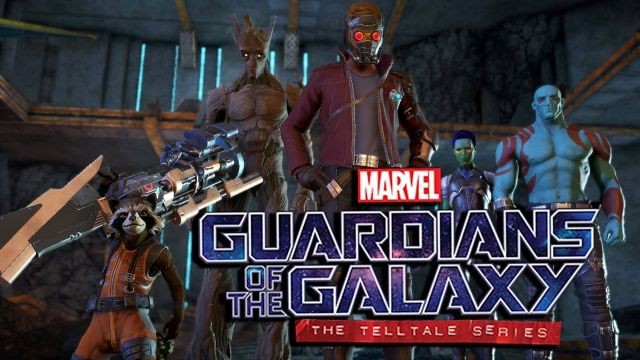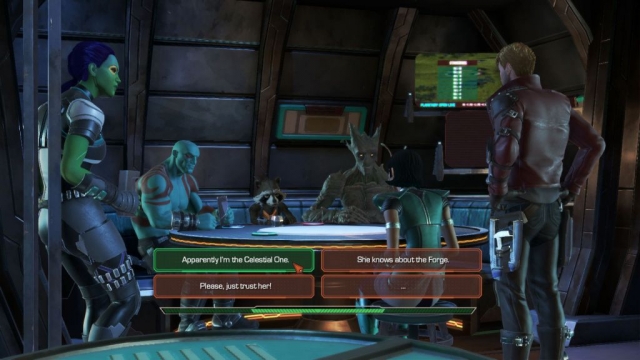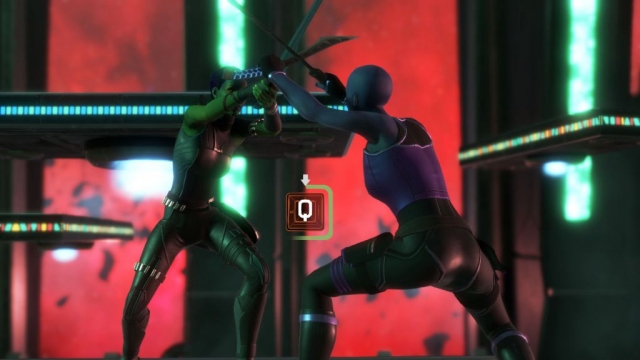Marvel’s Guardians of the Galaxy: The Telltale Series

Marvel’s Guardians of the Galaxy: The Telltale Series is the latest entry into Telltale Games’ interactive movie catalogue. In it, you control the Guardians of the Galaxy — mostly Peter “Star-Lord” Quill — as they protect the galaxy from bad guys and mysterious artifacts. The game doesn’t really fit in with the timelines of the movies or the comic books — for example, you meet the empath Mantis for the first time in the game, and she calls Peter a Celestial, but Kurt Russell is nowhere to be seen — but since the characters and backstories are the same, it’s easy to jump into the game and figure out what’s going on, even if you’ve never heard of the Guardians before. Previously we reviewed Episode 1 of the series. This review is for the entire first season.
As the game opens up, you defeat the Guardians’ longtime nemesis Thanos the Mad Titan. During the melee, the Guardians pick up an artifact called the Eternity Forge, which holds power over life and death. Since half of the Guardians’ backstories involve dead family members, this makes the artifact particularly relevant to them — not to mention useful to many others in the galaxy, including one of the few remaining members of the Kree race, Hala the Accuser, who wants to bring her people back to life no matter what the cost.
As a result — and perhaps surprisingly — the Guardians of the Galaxy game isn’t the same sort of jokey action-comedy as the movies. There are still jokes aplenty, but there are also numerous scenes involving death, loss, and “what ifs” about the past, and since this is a Telltale game, there are also many disagreements amongst the Guardians that you have to smooth over with Peter, with your decisions affecting morale and possibly who lives and dies. This different tone isn’t bad — in fact, it gives the game much more emotional heft than I was expecting — but it’s something to be aware of if adjectives like “deeper” and “more thoughtful” aren’t what you’re looking for.
Playing Guardians of the Galaxy works about the same as all of Telltale’s games. You have to talk to a lot of people, where you’re only given a limited amount of time to choose your responses; you have action scenes to navigate, where you use the WASD keys to dodge and the QE keys to perform actions; and you have investigative scenes, where you have to explore your surroundings and solve lightweight puzzles using the WASD keys and the mouse. The main difference for Guardians of the Galaxy is that the action scenes are pretty friendly. You can frequently miss key strikes and still survive, and even if you die you don’t have to go back very far to try again.
Another notable thing about Guardians of the Galaxy is that Telltale didn’t try to mimic the movie characters exactly, like they had done previously with their Game of Thrones characters and the HBO series. The Guardians and their enemies and allies look and sound roughly the same, so you can tell who everybody is, but by using different models and less expensive voice actors (who still did an excellent job), Telltale was able to save some money, which seems like it went into the script. Too many movies today — interactive or otherwise — treat their script like a red-headed stepchild, so it was nice to play a game where the script was king.
I’ve been lukewarm about most of Telltale’s games lately, but I really liked Guardians of the Galaxy. It handles the transition between jokes and drama well, your decisions are tougher and more meaningful than you usually see, the writing and voice acting are excellent, and the action sequences are simple and infrequent enough that they don’t derail the game. So if you haven’t played a Telltale game in a while, Guardians of the Galaxy is certainly one to check out.
Reviewed By: Steven Carter
Publisher: Telltale Games
Rating: 85%
——————————————————————————–
This review is based on a digital copy of Marvel’s Guardians of the Galaxy: The Telltale Series for the PC provided by Telltale Games.
 Game Over Online
Game Over Online










